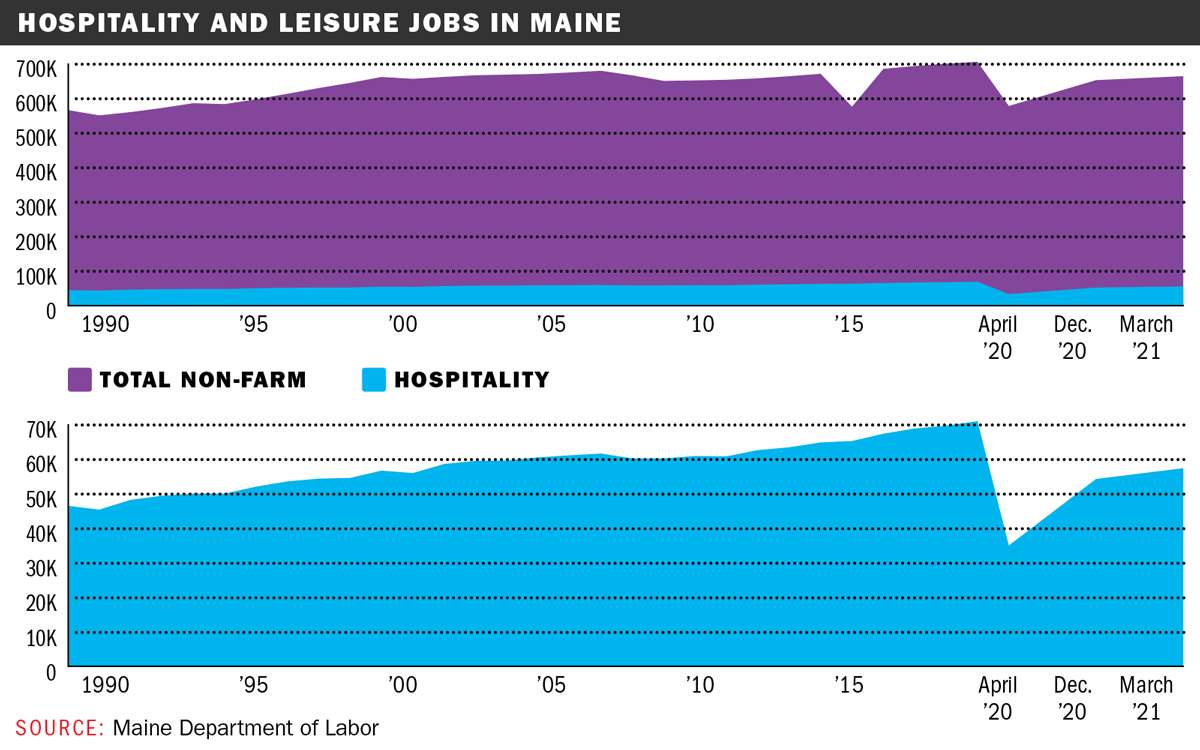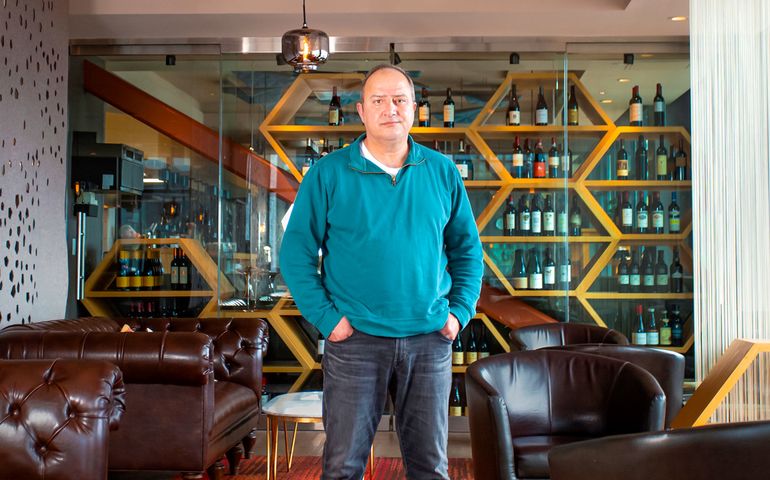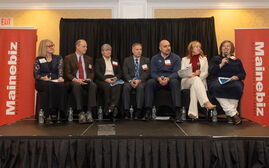
Hospitality’s newest hiring crunch: Maine businesses tout incentives to rebuild workforces
 Photo / Tim Greenway
Deen Haleem, co-owner of TIQA Mediterranean restaurant in Portland, closed the restaurant for three weeks this spring because of a staffing shortage.
Photo / Tim Greenway
Deen Haleem, co-owner of TIQA Mediterranean restaurant in Portland, closed the restaurant for three weeks this spring because of a staffing shortage.
After a busy start to 2021, Portland’s TIQA Mediterranean restaurant closed in April for three weeks due to a staffing shortage — reflecting an industry-wide hiring crunch brought on by the pandemic.
“The options were really horrible,” says Deen Haleem, who owns and operates the restaurant inside the Courtyard by Marriott with his wife, Carol Mitchell. “We could have kept our restaurant open, which would have led to really overworking the existing kitchen staff as well as bad service and long wait times.”
Instead, they’re using the time to deep clean and update menus.
Two weeks into the closure, the kitchen staff was up to eight, including two senior chefs as the search for a sous chef, baker and a third line cook continued. Frustrated about filling vacancies, Haleem says that interview no-shows are common and even received a message from one applicant who responded to a job ad with upfront demands about starting salary, scheduling and paid leave.
“I’ve been in the restaurant business for seven years and I’ve honestly never seen anything like this, not even remotely close,” Haleem says.
While he’s paying some new hires 20% to 30% more than he would have two months ago, he says he’s unable to go higher to lure people currently receiving state and federal unemployment benefits. Haleem’s troubles typify a national problem with strong repercussions in Maine, whose all-important hospitality sector lost thousands of jobs in 2020 and is still struggling to regain its footing.
Getting back on track
Nationwide, COVID’s impact on the travel industry has been nine times that of the 9/11 terrorist attacks, according to a January report by the American Hotel & Lodging Association.
It found that while the industry’s greatest resource is its workforce, 670,000 direct hotel industry operations jobs and nearly 4 million jobs in the broader hospitality industry were lost in 2020 due to the pandemic.
A separate study, by the National Restaurant Association, found that restaurants were hit harder than any other industry and “have the longest climb back” after losing 2.5 million jobs.
In Maine, the hospitality industry logged 13 straight years of growth through 2019. Then COVID hit, leading to a 26% plunge in statewide revenue to $2.26 billion in 2020, and a 25.6% drop in lodgings revenue to $799.7 million, according to research conducted for HospitalityMaine, the industry’s Augusta-based nonprofit trade association.
The workforce decrease was even greater, falling from 79,000 at the end of 2019 to 51,000 by the end of 2020.

While other industries have also suffered, “we were the most negatively impacted by the pandemic, so we’ve got the biggest hole to fill,” says Steve Hewins, who recently stepped down as HospitalityMaine CEO to head the trade association’s education foundation.
Data from the Maine Department of Labor reflect the same trend, showing 11,500 fewer leisure and hospitality jobs in March 2021 than a year earlier — the biggest one-year setback for any industry.
Glenn Mills, a state labor economist, notes that while the autumn virus surge stalled the rebound in hospitality jobs, things are starting to get back on track: “Vaccination rates are rising, and we expect the recovery in hospitality jobs will continue over the next several months,” he says.
Even if that’s true, Maine restaurants and hotels face a heavy lift staffing up, with far fewer seasonal workers who normally would have been hired by now. As the clock ticks towards the key summer season, that task is taking on greater urgency especially for tourism-related businesses.
They include Bar Harbor’s Terramor Outdoor Resort, a 60-acre “glampground” seeking to add five more employees for a 42-team total as it gets ready for its first full season.
In Bangor, the Hollywood Casino & Raceway’s entertainment complex employs 167 and is looking to hire 50 more, using incentives like sign-on bonuses of up to $1,000.
“That doesn’t even really seem to be moving the needle very much either,” says Kim Jenkins, director of human resources at Hollywood Casino, owned by Wyomissing, Pa.-based Penn National Gaming (Nasdaq: PENN).
Hollywood Casino puts a lot of effort into job fairs, where it gives applicants live demonstrations of jobs on the gaming floor and makes conditional job offers on the spot when the fit is right.
“We want the process to move along because otherwise we’re going to lose them,” says Jenkins, who wears her recruiting hat everywhere she goes.

At a retail checkout line, for example, she might encourage a friendly cashier to apply for a table-games dealer job at Hollywood Casino. Her basic pitch: “If you want to have fun at work and enjoy working with people, we’ve got a job for you.”
Among statewide food-related companies, French-owned Sodexo, which employs 760 people in Maine, is seeking to fill 100 positions this fall.
Dan Roy, a Sodexo district manager in Lyman, says that culinary positions are hardest to fill, particularly in rural areas. He frequently underscores in first interviews that a willingness to learn is more important than experience, adding, “You don’t have to be perfect from day one.” He also says that while Sodexo’s benefit package was robust pre-pandemic, it recently added tuition coverage for employees’ dependents as an extra incentive.
Franchisee frustrations
Elsewhere in the industry, franchisees are also experiencing hiring headaches.
Mike Connor, who owns Dunkin’ franchises in Lewiston, Lisbon, Richmond and Boothbay, currently employs between 43 and 50 people in total with plans to hire up to a dozen by summer.
“We’re always hiring because turnover is so high,” says Connor. “I’d love to get to the place where we’re hiring to replace. It’s like a never-ending battle.”
A former Boston Globe pressman who opened his first franchise in Lewiston in 2005, he recently moved that business from inside a gas-station convenience store into 2,000 square feet of space in a newly constructed 7,000-square-foot building. That new location opened in February.
Besides posting openings on job sites including Glassdoor and Indeed, Connor has a contract with TalentReef Inc., a Denver-based recruitment firm with a focus on high-volume, location-based hiring for hourly positions. Job fairs haven’t yielded many employees.
Connor says that pay rates vary by location. In Boothbay, where Hannaford hires at $19 an hour, “I’ve got to be competitive.”
For now, he’s not looking to add new locations unless something comes up for sale, noting, “We’re still trying to recover from this new contraction,” he says.
It’s a similar story for Firehouse Subs, which has five Maine fast-food restaurants.
“It’s the one consistent message that we hear from every one of our franchisees — hiring and retaining good quality labor is a challenge, and it has been for a while,” says Robert Baldacci, a Firehouse Subs area representative for New England with his wife Elizabeth.
Firehouse Subs, a Jacksonville, Fla.-based chain with franchises in Bangor, Waterville, Topsham, Auburn and Biddeford — and Westbrook’s Rock Row set to open this summer — has 15 to 20 people at each location.
Baldacci, who’s been in the restaurant business his whole life, got involved with Firehouse Subs more than a decade ago. While hiring at each location is left to individual franchisees, the Baldaccis help make sure job openings are posted on sites such as Indeed and CareerPlug and provide corporate marketing materials.
Speaking to Mainebiz after a call with other area reps nationwide, he says, “I heard this morning that a new restaurant was scheduled to open up in the central part of the U.S. and they’re holding off because they can’t find enough people to staff their opening, because it’s tough.”
From his regional vantage point, Baldacci sees how his franchisees struggle daily to offset higher labor costs with higher prices or sales volume but remains cautiously optimistic for Firehouse Subs.
“As franchisees are continuing to see increased sales,” he says, “they’ll hopefully increase some of their salary and wage packages to keep good people.”
HospitalityMaine’s Hewins is bullish on the sector as a whole, saying, “I am optimistic about the 2021 season because consumer demand is strong and Maine’s hospitality industry has proven during the pandemic to be innovative, resilient and adaptable to any challenge.”
TIQA’s Haleem is also positive and determined to keep the staff he has, saying, “I worry about them and look forward to reopening with them on board.”
Mainebiz web partners
If we want workers for the upcoming summer, Maine needs to refuse extra federal jobless payments that is idling thousands of workers. Montana has done just that to alleviate their employment crisis.
















1 Comments